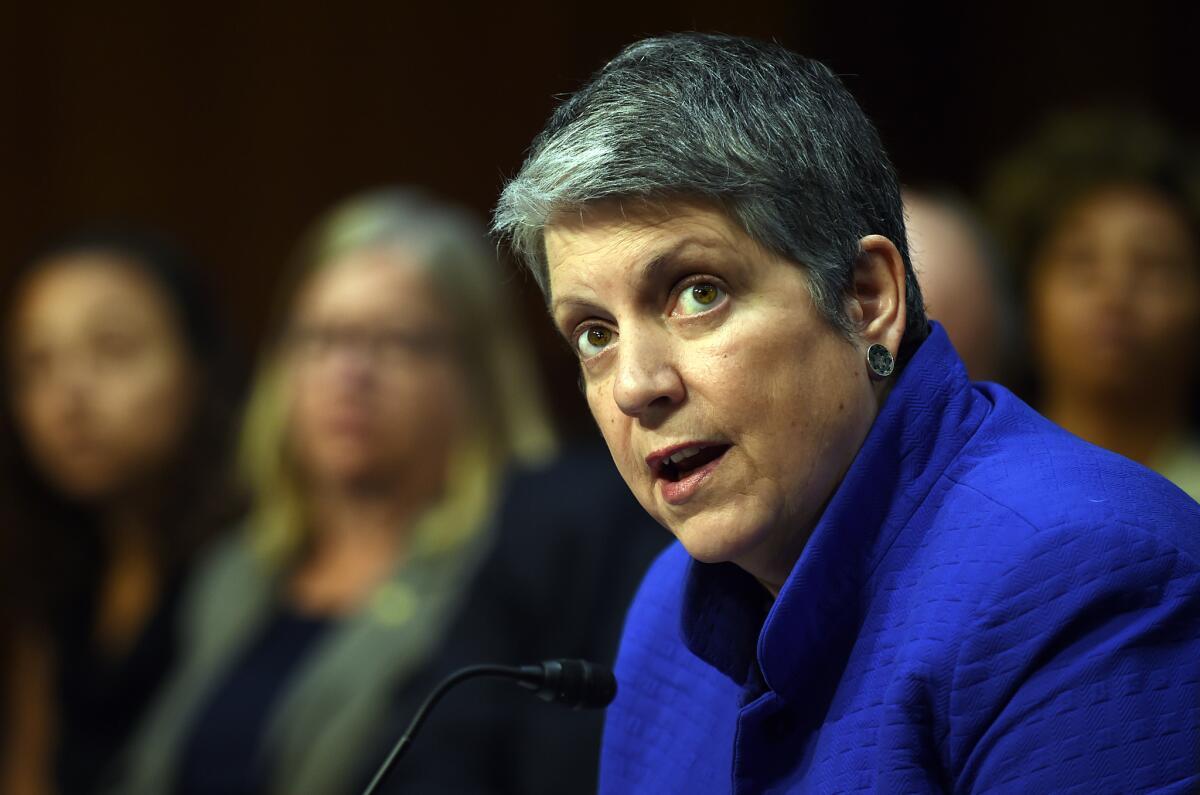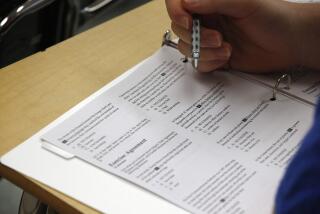SAT should be suspended for UC admissions, Napolitano says

- Share via
In a decision that could lead to a shake-up of the nation’s standardized testing landscape, University of California President Janet Napolitano is recommending the suspension of the SAT and ACT tests as an admissions requirement until 2024 and possible elimination after that.
In a proposal posted Monday, Napolitano is recommending a complex and unusual five-year plan that would make the tests optional for two years and eliminate testing requirements for California students in Years 3 and 4. Then, in Year 5, UC would move toward a standardized assessment developed specifically for the 10-campus system.
The plan would produce rich data on which students get admitted under each strategy and how they perform in college. It could also widen access to a UC education for more disadvantaged students. But the recommendation raises concerns about how campuses would implement different entry standards for different classes.
Napolitano’s decision could tip the scales against the tests among Board of Regents members, who are scheduled to vote on the controversial issue next week.
Her plan is not completely in line with the Academic Senate, which recently voted unanimously to keep the tests for five years while alternatives are researched. But Senate Chair Kum-Kum Bhavnani expressed appreciation that Napolitano adopted many key recommendations in a faculty task force report on testing, including development of a new assessment for the UC system.
“The Senate is pleased that the president’s recommendations are in line with the spirit of our recommendations,” Bhavnani said. “We look forward to working with the university to develop a new content-based test.”
Most campus admission officers, however, regard SAT and ACT scores as useful tools to help assess applicants and will be left with the task of figuring out how to evaluate tens of thousands of applications without them.
The UC system has temporarily suspended the testing requirement for fall 2021 applicants due to test cancellations triggered by the COVID-19 pandemic. But campuses were expected to reinstate the requirement for subsequent admission cycles after ACT and the College Board, which owns the SAT, announced plans to restart testing later this year.
A UC decision to permanently drop the testing requirements would have an enormous impact on the future of standardized testing because of the size and prestige of the public research university. Four-fifths of UC applicants take the SAT, making the system the largest single university source of customers for the College Board.
The six universities that receive the most applications in the nation are UC campuses in Los Angeles, San Diego, Irvine, Berkeley, Santa Barbara and Davis. Last year, the UC system received 215,000 undergraduate applications.
Napolitano has identified standardized testing as a top issue facing the UC system and said regents needed to “get it right” because of the national implications of their action. UC’s decision a half-century ago to require the SAT propelled the test to a place of national prominence, and a move to eliminate the requirement in the early 1990s prompted the College Board to revise the exam to satisfy UC objections about its bias and relevance for admission reviews.
Now, however, the momentum against the tests seems inexorable, with Napolitano joining other prominent UC critics, including board Chair John A. Pérez, Vice Chair Cecilia Estolano, Regent Eloy Ortiz Oakley, Provost Michael Brown and UC Berkeley Chancellor Carol Christ.
Critics argue that the SAT and ACT are heavily influenced by race, income and education levels of parents; question their value in predicting college success and express concern about inequitable access to test prep. Those concerns have prompted more than 1,000 colleges and universities to drop the testing requirement. A lawsuit against the UC system also calls for the requirement to be dropped.
But the College Board and ACT have strongly pushed back, saying the tests are not biased and reflect existing inequities in access to quality education. They also say that standardized tests offer a uniform and useful yardstick for use, in tandem with grades, in assessing students in high schools across the country.
Napolitano sought to craft a compromise between test supporters and opponents by eliminating the SAT and ACT requirements immediately but returning the UC system to a standardized assessment in five years.
A key constituency is the Academic Senate, which sets admissions requirements. Earlier this year, a Senate task force recommended that the university system keep the SAT and ACT for now while researching alternatives, including going test-optional and ultimately developing UC’s own assessment. That report was unanimously backed by the Senate assembly, made up of faculty leaders and campus representatives, 51-0 with one abstention.
Faculty were concerned that UC leaders would reject their report and usurp their authority in the fierce politics of the testing debate. But Napolitano appears to have successfully allayed many of their concerns.
Napolitano is proposing that UC experts launch a feasibility study this summer to identify a new test that assesses what the university expects students to master to demonstrate readiness for college. She said UC would consult with K-12 educators, test experts, UC faculty and California State University, which might also use the new assessment.
If no test can be created in time for fall 2025 applicants, use of the SAT and ACT would be eliminated completely for California students. That’s the one recommendation that gives Senate members pause, Bhavnani said.
Under Napolitano’s recommendation, students may choose to take the SAT and ACT until 2025 in order to qualify for scholarships, determine UC course placement or secure eligibility for admissions in one distinct category. Applicants from other states and countries could continue to use those tests, or possibly a new UC assessment.
In its own recommendation for a UC assessment, the faculty task force estimated it could take nine years to develop and some experts have put the potential cost at $100 million.
Sign up for Essential California
The most important California stories and recommendations in your inbox every morning.
You may occasionally receive promotional content from the Los Angeles Times.
However, Li Cai, a UCLA statistician, psychologist and testing expert, has said that UC could move more quickly — and share the cost — by marshaling a national coalition to develop a state-of-the art assessment within five years. A new assessment could potentially begin with ninth-graders, he said, analyzing their growth throughout high school, and use newer testing technologies to measure not only academic knowledge, but other valued qualities such as curiosity, resilience and collaborative problem-solving skills. Others, however, favor a single exam to minimize testing.
Napolitano’s recommendation to go test-optional for two years also is likely to gain faculty endorsement. Although the task force explicitly rejected a test-optional policy for now, Bhavnani said the COVID-19 crisis had since forced UC to adopt one for fall 2021 applicants. The Senate was probably going to recommend extending that policy for fall 2022 applicants as well, Bhavnani said, which would dovetail with Napolitano’s recommendation.
And while the Senate did not endorse test-blind admissions — meaning that UC would not use standardized test scores at all in admissions decisions even if submitted — faculty members seemed open to Napolitano’s recommendation to try that strategy for two years. Bhavani said it was an “intriguing” idea that she expected the Senate would want to discuss further.
Several campus admissions officers, for their part, have said they would prefer no test to an optional testing policy because they were concerned about administering different standards for different applicants and fairly evaluating students who don’t submit scores compared to those who do.
Napolitano also asked faculty leaders for additional analysis about the reasons why UC students do not fully reflect the state’s diversity. In its February review, the task force found that the biggest reasons for the mismatch was not the SAT, but that smaller proportions of disadvantaged students took the full suite of required college preparatory courses and applied to UC.
In what it called surprising findings, the Academic Senate’s review found that the SAT test actually helps disadvantaged students gain entry to the selective UC system. That’s because the way UC uses standardized test scores substantially corrects for bias by weighting them less heavily than grades and considering them as only one of 14 factors in a comprehensive review process, the report found. Campuses adjust for socioeconomic differences and admit disadvantaged students with lower test scores compared to more advantaged peers.
Other researchers, however, have criticized the task force’s findings as erroneous. Some faculty members are pushing to replace the SAT and ACT with the state test used to assess K-12 students, known as Smarter Balanced, because they say research shows it predicts college performance equally well, with less bias against disadvantaged students.
The task force rejected proposals to use Smarter Balanced, citing concerns over the exam’s suitability for UC, test security and viability for applicants from other states and countries. In addition, Cai said, state data show wide racial disparities on Smarter Balanced test performance.
Napolitano, however, left the door open for Smarter Balanced to be retooled for UC admissions, calling for experts to consider that test in efforts to “modify or create” a new assessment.
The UC president also asked the Senate to work with administrators to determine appropriate admissions requirements for out-of-state and international students beginning in 2025, when the SAT and ACT could be eliminated for Californians. To win admission to UC, nonresidents must “compare favorably” to California students, which typically has been evaluated in part with standardized test scores.
More to Read
Sign up for Essential California
The most important California stories and recommendations in your inbox every morning.
You may occasionally receive promotional content from the Los Angeles Times.











